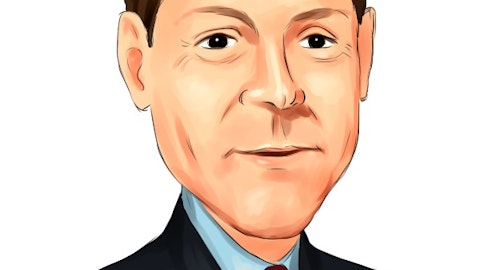Sanmina Corporation (NASDAQ:SANM) Q1 2023 Earnings Call Transcript January 30, 2023
Operator: Hello, and welcome to the Sanmina Corporation’s First Quarter 2023 Earnings Conference Call. All participants will be in listen-only mode. Please note, this event is being recorded. I would now like to turn the conference over to the Senior Vice President of Investor Communications, Paige Melching. Please go ahead.
Paige Melching: Thank you, MJ. Good afternoon, ladies and gentlemen, and welcome to Sanmina’s first quarter fiscal 2023 earnings call. A copy of our press release and slides for today’s discussion are available on our website at sanmina.com in the Investor Relations section. Joining me on today’s call is Jure Sola, Chairman and Chief Executive Officer.
Jure Sola: Good afternoon.
Paige Melching: And Kurt Adzema, Executive Vice President and Chief Financial Officer.
Kurt Adzema: Good afternoon.
Paige Melching: Before we begin our prepared remarks, let me remind everyone that today’s call is being webcasted and recorded and will be available on our website. You can follow along with our prepared remarks in the slides provided on our website. Please turn to Slide 3 of our presentation or the press release safe harbor statement. During this conference call, we may make projections or other forward-looking statements regarding future events or the future financial performance of the company. We caution you that such statements are just projections. The company’s actual results could differ materially from these projections in these statements as a result of a number of factors set forth in the company’s annual and quarterly reports filed with the Securities and Exchange Commission.
The company is under no obligation and expressly disclaims any such obligation to update or alter any of the forward-looking statements made in this earnings release, the earnings presentation, the conference call or the Investor Relations section of our website, whether as a result of new information, future events or otherwise, unless otherwise required by law. Included in our press release and slides issued today, we have provided you with statements of operations for the quarter ended December 31, 2022 on a GAAP basis as well as certain non-GAAP financial information. A reconciliation between the GAAP and non-GAAP financial information is also provided in the press release and slides posted on our website. In general, our non-GAAP information excludes restructuring costs, acquisition and integration costs, non-cash stock-based compensation expense, amortization expense and other unusual or infrequent items.
Any comments we make on this call as it relates to the income statement measures will be directed at our non-GAAP financial results. Accordingly, unless otherwise stated in this conference call, when we refer to gross profit, gross margin, operating income, operating margin, taxes, net income and earnings per share, we are referring to our non-GAAP information. I would now like to turn the call over to Jure Sola.
Jure Sola: Thanks, Paige. Good afternoon, ladies and gentlemen. Welcome, and thank you all for being here with us today. First, I would like to take this opportunity to recognize Sanmina leadership team and our employees for doing an exceptional job. So, to you, Sanmina’s team, thank you for delivering strong and consistent results for the first quarter of fiscal year 2023, and let’s keep it up. For agenda, we have Kurt, our CFO, to review details of our results for you; I will follow up with additional comments about Sanmina results and future goals; then Kurt and I will open for question and answers. And now, I would like to turn this call over to Kurt.
Kurt Adzema: Thanks, Jure. Please turn to Slide 5. As Jure mentioned, our team did an outstanding job delivering strong revenue and profit growth for the quarter. Q1 revenue of (ph) billion grew nicely by approximately 7.2% from the prior quarter and exceeded the high end of our outlook of $2.1 billion to $2.2 billion. This was primarily due to strong customer demand, as well as continued improvements in the supply chain. Non-GAAP gross margin was flat at 8.3%. Non-GAAP operating margin was 5.8% compared to 5.6% in the prior quarter. This was primarily due to operating expense leverage. Non-GAAP fully diluted earnings per share grew approximately 9% to $1.64 compared to $1.50 in the prior quarter, and exceeded the upper end of our outlook of $1.41 to $1.51 by $0.13.
Finally, Q1 GAAP fully diluted EPS was $1.48. Please turn to Slide 6. This slide shows the quarterly trends in our financial results. You can see here that non-GAAP operating margins have continued to improve over time. Furthermore, earnings per share grew over 50% from $1.08 in Q1 FY ’22 to $1.64 in Q1 FY ’23. Please turn to Slide 7. Q1 IMS revenue increased to $1.94 billion, an increase of 7.7% over the prior quarter, primarily due to strong customer demand and continued improvements in the supply chain. Non-GAAP gross margin for IMS was 6.9% compared to 7.2% in the prior quarter. This decline was primarily due to a reserve taken during the quarter related to a start-up customer. We expect IMS gross margins to return to a more normalized level in fiscal Q2.
Components, Products and Services revenue grew to $464 million, an increase of 3.8% over the prior quarter. Non-GAAP gross margin for CPS improved to 13.3% compared to 11.9% in the prior quarter, primarily due to better product mix. Now, please turn to Slide 8. We have a very healthy balance sheet, which provides our company a competitive advantage. Cash and cash equivalents were $735 million. The increase in cash was primarily due to $216 million as a result of the previously announced joint venture in India, which closed on October 3, 2022. At the end of the quarter, there were no borrowings outstanding under our $800 million revolver. Cash flow from operations was $37 million in Q1. Cash flow is typically lower during our first fiscal quarter, given the calendar year-end.
Capital expenditures were approximately $37 million in Q1. Our free cash flow was approximately $1 million in Q1. Now turn to Slide 9. We continue to focus on the management of working capital. Cash cycle days remained relatively flat at 50 days in Q1. Non-GAAP pre-tax ROIC was 35.5% for Q1. Please turn to Slide 10. Let’s talk a bit about the outlook for Q2. Overall, customer demand remained strong, but there continues to be uncertainty related to the supply chain as well as the macroeconomic and political environment. We expect Q2 revenue to be in the range of $2.2 billion to $2.3 billion. Typically, there is some seasonal impact in our fiscal Q2. We expect non-GAAP gross margins in the range of 8.2% to 8.7% depending on product mix. Non-GAAP operating expenses in the range of $59 million to $61 million, primarily due to the annual re-setting of the employer portion of payroll tax and any annual salary adjustments.
And non-GAAP operating margin in the range of 5.5% to 6%. We expect non-GAAP interest and other of $15 million, primarily driven by the increase in interest rates. In addition, we estimate an approximate $3 million non-cash reduction to our net income to reflect our JV partner’s equity interest in the net income of the Indian JV. We expect non-GAAP taxes of approximately 18%. The fully diluted non-GAAP share count of 60 million shares. When you take all of this guidance into account, our outlook for non-GAAP diluted earnings per share is in the range of $1.50 to $1.60. We expect Q2 capital expenditures of around $50 million, driven by the growth of new programs as well as to support future growth. Q2 depreciation is expected to be around $30 million.
While we are pleased with our recent results, we continue to believe that there is opportunity to further improve our business model over the long term. And with that I’m going to turn it back to Jure.

Jure Sola: Thank you, Kurt. Ladies and gentlemen, let me add few more comments about our financial highlights for the first quarter and I’ll review our end markets and outlook for the second quarter and the rest of the fiscal year 2023. As you heard from Kurt, for the first quarter, Sanmina delivered strong and consistent results. The key highlights were: growth was broad-based, driven by strong demand from our end markets; and performance of our supply chain organization was excellent by working closely with our customers and suppliers. We can also tell you that the lead times for semi components is getting better. We saw nice improvements in the first quarter. Despite ongoing macroeconomic uncertainty, these results are a reflection of our continued focus on execution of our strategy.
Our Sanmina team has done an outstanding job as we continue to differentiate our industry-leading capabilities, and all of this is continuing to translate into growth and margin expansion for Sanmina. Please turn to Slide 12. Let’s look at the revenue for our first quarter by end markets. I can tell you that the demand for our products was strong across all markets. For Industrial, Medical, Defense and Automotive segments, we delivered a revenue of $1.345 billion, which was quarter-over-quarter growth of 4.5% and year-over-year, 27.5%. For Communication Networks & Cloud Infrastructure, we delivered $1.016 billion, which was quarter-over-quarter growth of 11% and year-over-year, 44.6%. Total for our first quarter, we delivered $2.361 billion.
It was nice organic growth, quarter-over-quarter growth of 7.2% and year-over-year growth of 34.4%. For the first quarter, top 10 customers were 50.6% of our revenue. Overall, we are seeing strong demand and solid backlog for our future. In summary, we are off to a good start for fiscal year 2023. Please turn to Slide 13. Now, let me review our second quarter end markets outlook. The key markets for Sanmina are industrial, medical, defense and aerospace, automotive, communication networks and cloud infrastructure. As you can see, Sanmina does not serve consumer markets at all, but our focus is on high-complexity, heavy regulated markets. For us, this is a seasonally down quarter, but with healthy backlog, we have strong outlook for the second quarter of $2.2 billion to $2.3 billion.
We expect to see some supply constraints to continue through our second quarter and beyond. But good news is that things are getting a lot better. As I look at the rest of the fiscal year 2023, I’m excited about Sanmina’s future. For fiscal ’23, we expect to deliver nice improvements over fiscal year ’22. At this time, we’ve seen a strong outlook from our key customers. Revenue growth will be driven from existing and new programs. We are well diversified in the growth markets. Strong pipeline of new opportunities will continue to drive growth for the future. Margin expansion to be driven by revenue growth in IMS segment and by continuous improvements in manufacturing efficiencies. Margin expansion at CPS segment will be driven by technology components, defense products, optical packaging and other services.
And lean OpEx leverage as we continue to drive efficient structure. Now let me talk to you about managing through these challenging macroenvironment. From Sanmina’s management point of view, we have positioned the company to be able to navigate any market dynamics that could come up in the future. Sanmina has embedded resiliency in our focused market space and strong global management to do the job. Again, Sanmina is well positioned for any economical environment. Our priorities have not changed. Strategy is working and it’s delivering results. Our focus today is on quality of our customer base, building right partnerships. We are focused on continuing to diversify revenue growth with market leaders in mission-critical products. We’re focused on quality of earnings, delivering consistency and growth of our earnings.
We’re focused on quarterly and yearly cash flow. And we are focused on maximizing shareholders value, short-term and long-term. I can also tell you there is still lot of leverage at Sanmina’s business model. Please turn to Slide 14. So, in summary, as you heard from both Kurt and I, we delivered a strong quarter, with solid execution, revenue of $2.36 billion, growth of 7.2% quarter-over-quarter and growth of 34.4% year-over-year. And non-GAAP operating margin, we improved by 20 basis points to 5.8%. And we delivered a non-GAAP diluted EPS of $1.64, growth of 9.5% quarter-over-quarter and 52.7% year-over-year. For second quarter, we are forecasting, again, strong revenue outlook of $2.2 billion to $2.3 billion, typically this is seasonally down quarter for us, but the demand is strong and backlog is strong.
So, non-GAAP diluted EPS, we’re forecasting of $1.50 to $1.60. As Kurt said, we believe there’s still upside, as we continue to look at opportunities in front of us, we believe we can improve our business model over the long term. So, ladies and gentlemen, now I would like to thank you all for your time and support. Operator, we’re now ready to open the lines for question and answer. Thank you. Operator?
See also 25 Least Developed Countries in Europe and Top 20 Financial Cities in the World.
Q&A Session
Follow Sanmina Corp (NASDAQ:SANM)
Follow Sanmina Corp (NASDAQ:SANM)
Receive real-time insider trading and news alerts
Operator: Thank you. We will now begin the question-and-answer session. Today’s first question comes from Jim Suva with Citigroup. Please go ahead, Jim.
Jure Sola: Hello, Jim.
Jim Suva: Hello. Good evening. Thank you so much for the details. Some of your peers have talked about some inventory digestion or inventory buffer that needs to be worked down. Are you seeing that in any of your markets? And if so, which ones and how long? Or I’m just kind of curious on that topic and I probably have a follow-up.
Jure Sola: Yes. Jim, definitely during this period, as you know, when our customer gives us a forecast, we’re basically bringing inventory based on their needs, but then there was a lot of shortages, and sometimes we had to wait for those shortages a little bit longer and in end of the day inventory went up. We believe we’re at the peak. As we look at the next couple of quarters, we expect to work that inventory down and generate more cash. So that’s kind of where we are at. It’s across all the markets, Jim. It’s not just one then another, it’s all — really more customer-driven than just the markets itself.
Jim Suva: Okay. So, across several. And then, you have seen a lot of success in recent years with your cloud hyperscaler server storage. And just, can you update us on that and give us some view on additional colors on that effort?
Jure Sola: Well, that segment for us, if you look at the last quarter, communication network and cloud computing did pretty well, grew about 11%-plus. So, we always were well positioned in that market. It’s, again, we got a lot of new programs there. Overall, we’re very positive. Jim, we take one quarter at a time. We’re a lot more confident about ’23, let’s say, today than we were six months ago. So, I will take one quarter at a time and we expect to grow these markets.
Jim Suva: Thank you so much for the details, and congratulations to you and your teams at Sanmina.
Jure Sola: Thank you, Jim.
Operator: The next question comes from Anja Soderstrom with Sidoti. Please go ahead.
Anja Soderstrom: Hi, and thank you for taking my questions. So, you’re talking about…
Jure Sola: Hi, Anja.
Anja Soderstrom: Hi, and congratulations on the good quarter.
Jure Sola: Thanks.
Anja Soderstrom: You’re talking about a nice improvement for fiscal 2023, but you don’t really quantify it. If I think about the growth for the next couple of quarters, the second quarter seems to be stronger even though you normally have seasonal weakness there. So, should we expect sequential revenue increase throughout the year?





